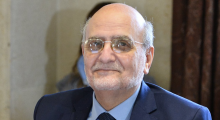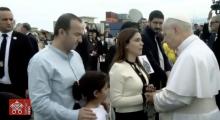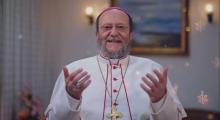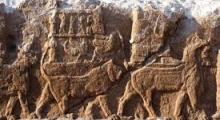Issued by the Catholic Center for Studies and Media - Jordan. Editor-in-chief Fr. Rif'at Bader - موقع أبونا abouna.org
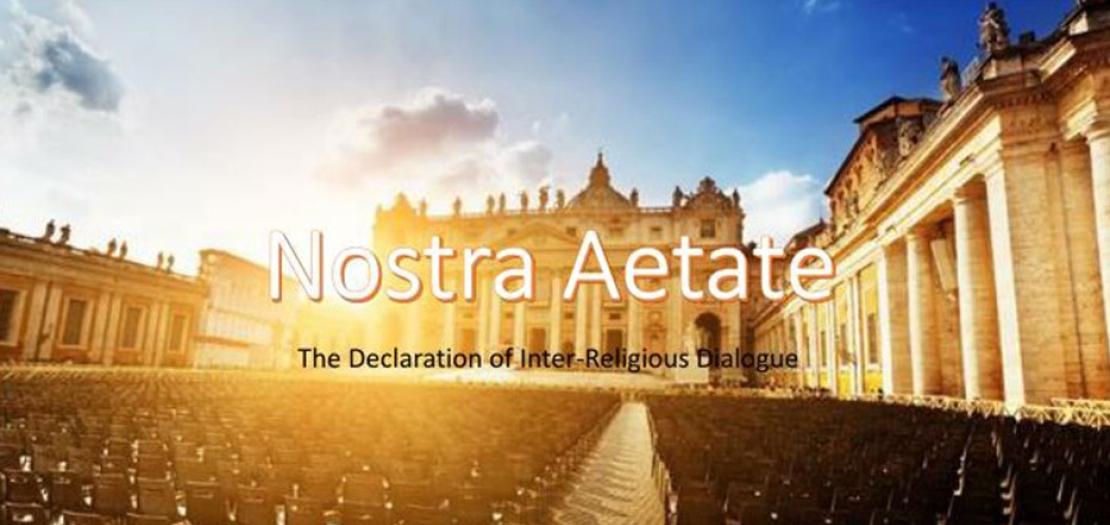
In commemoration of the 60th anniversary of the document "Nostra Aetate," the Episcopal Committee, established by the Council of Maronite Bishops and Presided Over by His Beatitude Cardinal Mar Bechara Boutros Al-Rai, Maronite Patriarch of Antioch and All the East, and under his guidance, organized a symbolic celebration on Saturday, November 8, 2025, at the Maronite Patriarchal Edifice in Bkerke, Lebanon. The committee included Their Eminences Archbishops Guy Paul Najem, Paul Matar, Youssef Soueif, and Hanna Rahme.
The celebration was held in the presence of His Beatitude Patriarch Al-Rai, His Beatitude Patriarch Mor Ignatius Joseph III Younan, Syriac Catholic Patriarch of Antioch, and Honorary President of the Middle East Council of Churches (MECC), His Excellency Archbishop Paolo Borgia, Apostolic Nuncio, Reverend Dr. Paul Haidostian, President of the Union of the Armenian Evangelical Churches in the Near East (UAECNE), President of Haigazian University in Lebanon, and President of the Middle East Council of Churches (MECC) for the Evangelical Family, Sheikh Sami Abi Al-Muna, Sheikh Al-Aql of the Unitarian Druze Community, and with the participation of Sheikh Abdul Latif Derian, Grand Mufti of the Lebanese Republic, Represented by Sheikh Muhammad Imam, Mufti of Tripoli and the North, Sheikh Ali Al-Khatib, Vice President of the Supreme Islamic Shiite Council, Represented by Sheikh Hassan Abdallah, Mufti of Tyre and Jabal Amel, Sheikh Ali Qaddour, President of the Alawite Council in Lebanon, Represented by Sheikh Ahmad Assi, and the Secretary General of the Middle East Council of Churches (MECC) Professor Michel Abs.
Cardinal George Koovakad, Prefect of the Dicastery for Interreligious Dialogue at the Holy See, also participated with a video message addressed to the Religious and lay people from various denominations.
Professor George Arab opened the meeting with a speech highlighting its themes. His Beatitude Patriarch Al-Rai delivered a speech in which he presented the historical path of the document since its issuance in 1965, in the Church’s endeavor to erase the effects of World War II, and to promote opportunities for dialogue and convergence for a reconciled and peaceful world. He said: “The document is like an invitation to all believers to recognize and promote the spiritual and moral virtues, and the social, cultural, and ethical values, that arise from dialogue and encounter between different Religions.”
Afterwards, speeches were delivered by Sheikh Qaddour, Represented by Sheikh Assi; Sheikh Khatib, Represented by Mufti Abdallah; and Mufti Darian, Represented by Mufti Imam. Then, Sheikh Abi Al-Muna delivered his word. The speeches focused on the importance of disseminating the document's contents related to interfaith dialogue and how to utilize them to strengthen Muslim-Christian relations and the experience of coexistence in Lebanon.
Moreover, His Beatitude Patriarch Younan addressed the audience, discussing the document's contents and the commitment of both Christians and Muslims to it, as well as expanding their common ground by launching practical joint initiatives. He emphasized the need to recognize the danger of Lebanon and the Middle East being devoid of Christians, citing the events in Syria and Iraq as indicators of this growing and dangerous void.
His Eminence Bishop Charles Mrad, Head of the Episcopal Committee for Christian-Muslim Dialogue, read the message from Cardinal Koovakad, which stated: "Sixty years ago, the Second Vatican Council presented to the world a prophetic gift in the form of this document, which addresses the Church's relationship with other Religions. This declaration called upon the Church to recognize the presence of God in the diversity of human faith." The message continued: "On this sixtieth anniversary, I extend my special greetings to the Muslim and Christian figures gathered here today. Let this commemoration be a renewal, not a repetition.”
For his part, the Secretary General of the Middle East Council of Churches (MECC) Professor Michel Abs delivered a speech in which he said: “The Council’s identity also embraces non-Christians in the region. From its early years, it was, by the Churches’ mandate and in their name, the primary interlocutor with Muslims of various denominations. Their leaders have consistently regarded the MECC as an honest and genuine partner who means what he says and embodies his words in action.”
He added, “The concept of ecumenism in the MECC has expanded: once referring only to Christians in all their diversity, it now embraces all people of the world, those for whose sake the Lord was incarnate, for their salvation, and so that they might have life, and have it abundantly.”
The meeting also included other speeches focusing on the meanings of the document and its most prominent themes, in addition to joint practical initiatives.
Monsignor Abdo Abou Kassem, Director of the Catholic Media Center, delivered the introduction to the recommendations and future aspirations, which were delivered at the end by Archbishop Youssef Soueif, Coordinator of the work of the Episcopal Committee.


